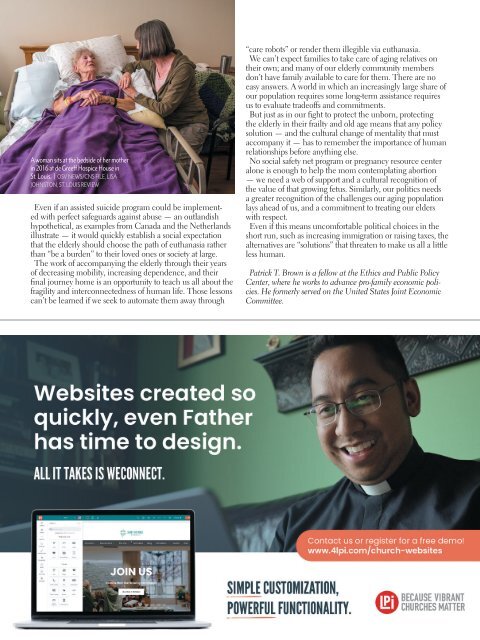Angelus News | March 22, 2024 | Vol. 9 No. 6
On the cover: To cap off a nearly five-decades-long career working in Church communications, Francis X. Maier had an ambitious book idea: a ‘snapshot’ of the Church in America at this time in history that captured both its strengths and its sicknesses. On Page 10, Maier shares what he took away from hearing more than 100 “confessions”’ with American Catholic leaders for the project. On Page 20, John L. Allen Jr. offers his own diagnosis of the uneasy relationship between U.S. Catholics and Rome during the Pope Francis pontificate.
On the cover: To cap off a nearly five-decades-long career working in Church communications, Francis X. Maier had an ambitious book idea: a ‘snapshot’ of the Church in America at this time in history that captured both its strengths and its sicknesses. On Page 10, Maier shares what he took away from hearing more than 100 “confessions”’ with American Catholic leaders for the project. On Page 20, John L. Allen Jr. offers his own diagnosis of the uneasy relationship between U.S. Catholics and Rome during the Pope Francis pontificate.
Create successful ePaper yourself
Turn your PDF publications into a flip-book with our unique Google optimized e-Paper software.
A woman sits at the bedside of her mother<br />
in 2016 at de Greeff Hospice House in<br />
St. Louis. | OSV NEWS/CNS FILE, LISA<br />
JOHNSTON, ST. LOUIS REVIEW<br />
Even if an assisted suicide program could be implemented<br />
with perfect safeguards against abuse — an outlandish<br />
hypothetical, as examples from Canada and the Netherlands<br />
illustrate — it would quickly establish a social expectation<br />
that the elderly should choose the path of euthanasia rather<br />
than “be a burden” to their loved ones or society at large.<br />
The work of accompanying the elderly through their years<br />
of decreasing mobility, increasing dependence, and their<br />
final journey home is an opportunity to teach us all about the<br />
fragility and interconnectedness of human life. Those lessons<br />
can’t be learned if we seek to automate them away through<br />
“care robots” or render them illegible via euthanasia.<br />
We can’t expect families to take care of aging relatives on<br />
their own; and many of our elderly community members<br />
don’t have family available to care for them. There are no<br />
easy answers. A world in which an increasingly large share of<br />
our population requires some long-term assistance requires<br />
us to evaluate tradeoffs and commitments.<br />
But just as in our fight to protect the unborn, protecting<br />
the elderly in their frailty and old age means that any policy<br />
solution — and the cultural change of mentality that must<br />
accompany it — has to remember the importance of human<br />
relationships before anything else.<br />
<strong>No</strong> social safety net program or pregnancy resource center<br />
alone is enough to help the mom contemplating abortion<br />
— we need a web of support and a cultural recognition of<br />
the value of that growing fetus. Similarly, our politics needs<br />
a greater recognition of the challenges our aging population<br />
lays ahead of us, and a commitment to treating our elders<br />
with respect.<br />
Even if this means uncomfortable political choices in the<br />
short run, such as increasing immigration or raising taxes, the<br />
alternatives are “solutions” that threaten to make us all a little<br />
less human.<br />
Patrick T. Brown is a fellow at the Ethics and Public Policy<br />
Center, where he works to advance pro-family economic policies.<br />
He formerly served on the United States Joint Economic<br />
Committee.<br />
24 • ANGELUS • <strong>March</strong> <strong>22</strong>, <strong>2024</strong>

















